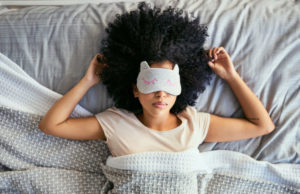Sound familiar? Despite its impact on our health and implications for aging, sleep has gradually moved its way down our list of priorities, edged out by endless to-dos and a pressure to keep up.
Insufficient sleep has been linked to several medical conditions, such as obesity, diabetes and cardiovascular disease, each of which develops over long periods of time and results from a number of factors, such as genetics, poor nutrition and lack of exercise. Most experts now agree that getting enough high-quality sleep may be as important to health and well-being as other variables.
Excessive fati gue impacts not only our physical health, but our mental well-being, too. The National Sleep Foundation suggests that even small levels of sleep deprivation overtime can affect your outlook on life, energy level, motivation and emotions. Research has shown that those with insomnia have greater levels of depression and anxiety than those who sleep normally, and are 10 times as likely to have clinical depression and 17 times as likely to have clinical anxiety.
gue impacts not only our physical health, but our mental well-being, too. The National Sleep Foundation suggests that even small levels of sleep deprivation overtime can affect your outlook on life, energy level, motivation and emotions. Research has shown that those with insomnia have greater levels of depression and anxiety than those who sleep normally, and are 10 times as likely to have clinical depression and 17 times as likely to have clinical anxiety.
The relationship between mood and sleep is complex because while a disrupted night’s rest can contribute to emotional changes, clinical depression or anxiety, these disorders can also compound or further disrupt sleep. As altered sleep patterns are a common symptom of many mental health concerns, it’s important to talk with your doctor if you find yourself sleeping too much or too little on a regular basis so you can appropriately determine the underlying cause.
While the state of our sleep cycles may seem grim, a sound night’s sleep is well within reach. Don’t sweat it if you lose a couple hours here or there — it’s easy to make up for a short-term deficit.
Practicing good sleep hygiene is key to drifting off to dreamland. If this phrase is new to your vocabulary, it might be time to take notes. The National Sleep Foundation defines sleep hygiene as “a variety of different practices and habits that are necessary to have good nighttime sleep quality and full daytime alertness.” Recommendations include limiting daytime naps to 30 minutes, avoiding caffeine and alcohol close to bedtime, exercising regularly and establishing a regular relaxing bedtime routine.
Developing a consistent nighttime ritual helps the body recognize that it’s time to wind down. Consider taking a warm shower or soaking in the bath, drinking a cup of herbal tea, reading, meditating or listening to soothing sounds. As blue light from electronic devices can make it difficult to fall asleep, it’s best to turn them off an hour before bedtime. You might also consider using a white noise machine, humidifier or fan if you’re sensitive to nighttime noise.
If you find yourself falling asleep as soon your head hits the pillow, this may not necessarily mean you’re a good sleeper. Alternatively, it’s more likely an indication that you’re sleep deprived. “In general, it should take about 10 to 20 minutes for a person to drift off,” according to a 2018 study published in the Nature of Science and Sleep Journal. If you’re still lying awake after 20 minutes of hopping into bed, get up and move to another space in the house where you can do something relaxing.
Forcing yourself to stay put when you can’t sleep can increase anxiety and create an unhealthy link between your sleeping environment and wakefulness. When you feel tired again, return to bed. If worrisome thoughts are keeping you awake, consider doing a progressive muscle relaxation or guided imagery exercise.
While sleep may not always come easy, our bodies and minds depend on it to get us through morning frenzies, afternoon slogs and warrior weekends. Stop glorifying your fatigue and start celebrating being well-rested. Ditch the power naps and dark circles and say hello to the restorative power of a sound night’s sleep.







